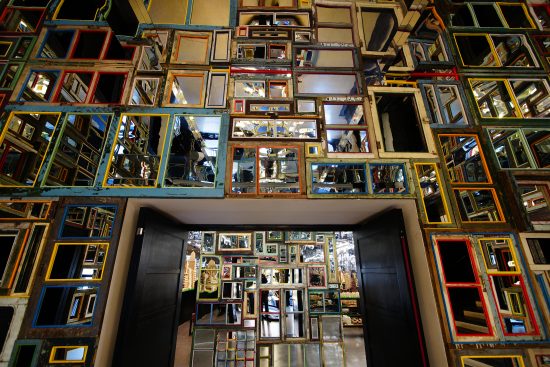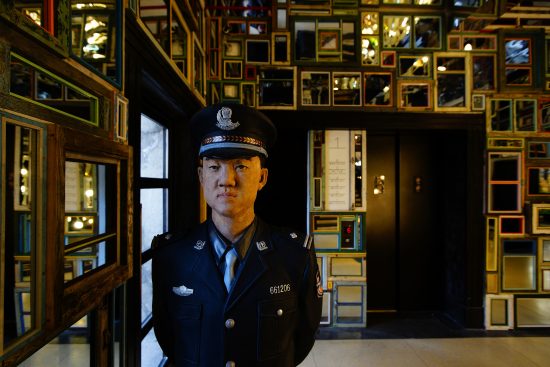 |
| Song Dong, Wisdom of the Poor: Song Dong’s Para-Pavilion, Old house, old furniture, steel, Dimensions variable. 2011. Photograph, LG |
As you will see, I loved this show.
Song Dong, Mirror Hall, Mirrors, old wooden window frames, mirror boards, Dimensions variable. 2016–2017. Image courtesy Rockbund Art Museum
‘I Don’t Know the Mandate of Heaven’ is a mature artist’s reflection on life’s joys, dreams, fears and disappointments. Beijing-based conceptual artist, Song Dong, responds to one of the Analects of Confucius, in which the sage suggests that by the age of 50, one ought to be sure of one’s place in the universe, should know ‘the mandate of heaven’. The getting of wisdom, if you like, should be done and dusted. Across six floors of Shanghai’s Rockbund Museum, and across its façade, rooftop balcony, stairwells and elevators, Song Dong responds to Confucius with all the uncertainty and anxiety of a more complicated age: ‘At 10, I was not worried. At 20, I was not restrained. At 30, I wasn’t established. At 40, I was perplexed and at 50, I don’t know the mandate of heaven.’
The exhibition is divided into seven ‘chapters’, one for each floor of the museum and the seventh for the exterior. Each chapter is represented by a Chinese character; together they form a line of a verse:
Jing (mirror), Ying (shadow), Yan (word), Jue (revelation),
Li (experience), Wo (self), and Ming (illumination).
Entering, you are immersed in a structure of re-purposed window frames and mirrors, a (literal) Daoist reflection on the fleeting nature of the physical world, beautiful and unsettling. Within the structure you find Song’s homage to Duchamp’s first readymade. The Use of Uselessness: Bottle Rack Big Brother (2016) is an enlarged version of Duchamp’s inverted bottle rack; on its prongs are discarded bottles that once held whiskey or powerful Chinese baijiu. Lit to resemble a fallen chandelier, they have been cleverly arranged to look a lot like the ubiquitous surveillance cameras that watch our every waking moment. This modern day panopticon has particularly chilling connotations in China, and the work reminds us that surveillance has been a recurring theme in Song’s work. Another work that hints at the heavy hand of the state is found on the third floor. ‘Slogans’ is a maze of fencing and the red banners with white text that you see everywhere in Chinese cities, hanging on fences, outside schools and across the entrance to apartment buildings. Visitors were forced to follow a narrow, circumscribed path through the fences, with the most popular political slogans of the last century and today looming over them – there was no possible alternative route. Sixteen watchful fibreglass policeman with Song Dong’s face are positioned throughout the exhibition.
Song Dong, Mirror Hall, installation view, Mirrors, old wooden window frames, mirror boards, Dimensions variable. 2016–2017. With policeman figure from the series Policemen. Fiberglass, acrylic painting, 170 cm in height, 16 pieces. 2000–2004. Image courtesy Rockbund Art Museum

